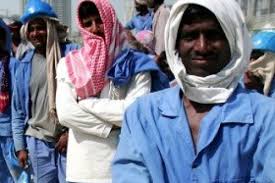On 7 June 2017, migrant laborers staged a rally with almost one hundred demonstrators, consisting of mostly Indian and Bangladeshi workers. The gathering is a notable occurrence in a country that enforces extreme restrictions on the right to free assembly. It was held in Sanad and called for the workers to be paid by their construction company for salaries owed up to five months.
Bahrain’s Ministry of Labour and Social Development (MLSD) responded by sending officials to speak with the protesters on 8 June 2017. Dr. Mohammed Ali al Ansari, the ministry’s Assistant Undersecretary for Labour Affairs, said in a statement that the MLSD acknowledges that workers have not been paid for months, deeming the problem urgent. He said he expected the problem to be resolved “by next week”.
Hasan al Halwachi, General Secretary for the General Federation of Bahrain Trade Union (GFBTU), Bahrain’s largest trade union, spoke in support of the demonstrators. He responded to the Ministry statement by citing directives from Prime Minister Prince Khalifa bin Salman al Khalifa that were issued to pay the workers. He claimed no such payments were made, criticizing authorities for not dealing with the issue when it first arose. He also referenced the ongoing International Labour Organization (ILO) conference in Geneva, Switzerland, noting that the protest “will not reflect well” on Bahrain.
This demonstration was the second of its kind in several months. The same workers protested in March 2017, but dispersed after police intervened. At the time, the workers had not been paid an entire year’s salary. Though Bahraini officials and representatives of the respective embassies settled on a temporary solution, it did not resolve the underlying problems.
Withheld salaries are not a new phenomenon in Bahrain. In April 2017, 15 Indian migrant workers filed complaints with the Indian embassy after the refinery at which they worked terminated the men’s contracts. The men had not been paid for six months prior to their termination. Just a month before, the Bangladeshi embassy refused to administer work permits for Bangladeshis trying to work in Bahrain after receiving too many complaints of unpaid salaries from Bangladeshi migrant workers.
Expatriates compose almost 80% of the workforce in Bahrain, and the majority of these workers come to Bahrain with promises of high wages they can send home to their families. The GFBTU’s al Halwachi alluded to the importance of these remittances, suggesting the unpaid salaries negatively impact not just the workers themselves, but also the family members who rely on them for basic costs of living back home.
On 14 June, Bahraini media reported that the construction company has finally begun to pay the protesting workers following pressure from the authorities. The apparently positive resolution to this dispute, while rare, is encouraging, especially coming as a result of sustained migrant labor organizing and peaceful protest.
However, the core problem of labor exploitation is deeply rooted in Bahrain, and employers will continue to subject migrant workers to abuse if the authorities fail to institutionalize proper protections. Migrant workers in Bahrain are at high risk of a range of rights violations, including withheld salaries, due to the kafala labor sponsorship system that allows employers to exercise excessive authority over their employees. It is common for employers to subject migrant workers to abusive practices like debt bondage and contract substitution, or to force them to live in unhygienic and unsafe labor camps. In a recent instance, a sponsor stole the passport of his Filipino employee and demanded she pay a ransom in order to have it returned.
On two separate occasions in 2009 and 2016, the Bahraini government announced that it would abolish the kafala system. However, the government’s February 2017 National Report to the UN’s Universal Periodic Review (UPR) Working Group revealed that the proposed “abolition” is actually manifesting as a miniature test program for a new type of expatriate visa that would theoretically bypass sponsorship. Since then, the government has not provided any statistics about the project’s progress and has yet to prove that even a single sponsor-less work visa has been granted. Furthermore, the Bahraini government has yet to clarify if or how it will rectify the situation of workers currently subject to the kafala system or related practices.
The Government of Bahrain must match rhetorical commitments to labor reform with real, enforceable protections for migrant workers. Such a reform package would necessarily entail the actual abolition of the kafala system in both law and practice, in order to ensure that migrant workers are no longer subjected to abuses like wage withholding and debt bondage.
Alex DiBell is an Advocacy Intern at ADHRB.





